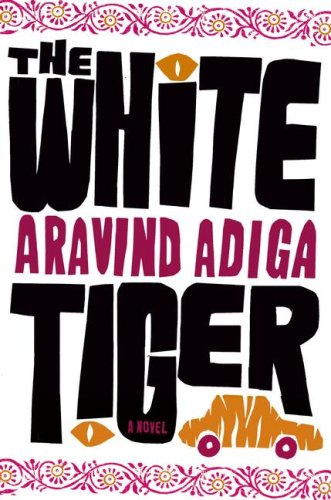[Repescado do fundo do baú. Escrito em Dezembro de 2008]

Aravind Adiga, The White Tiger. Atlantic Books, London, 2008
ISBN 978-1-84354-720-4
Preço (Amazon.co.uk): £6,49 / €7,50
ISBN 978-1-84354-720-4
Preço (Amazon.co.uk): £6,49 / €7,50
At a time when India is going through great changes and, with China, is likely to inherit the world from the west, it is important that writers like me try to highlight the brutal injustices of society. That's what writers like Flaubert, Balzac and Dickens did in the 19th century and, as a result, England and France are better societies. That's what I'm trying to do - it's not an attack on the country, it's about the greater process of self-examination.
Quem o diz é o indiano Aravind Adiga, vencedor do Man Booker de 2008, com o romance The White Tiger, em entrevista ao The Guardian.
Munna, aliás Balram, aliás Ashok, é um empreendedor indiano de Bangalore. Pelo menos é assim que se apresenta por carta ao primeiro-ministro chinês, Wen Jiabao, de visita à Índia. Balram - chamemos-lhe assim, pois é assim que se apresenta durante a maior parte do tempo - acredita que o futuro não pertence ao Branco, mas ao Castanho e ao Amarelo. Por isso apresenta a Jiabao a sua história, como saiu de uma vida miserável numa aldeia nas margens do Ganges, e se tornou um empreendedor de sucesso, na esperança de assim ajudar a China a formar os seus próprios empreendedores. E fá-lo por meio de uma série de cartas, onde, numa escrita aparentemente simples, se traça um retrato arrepiante de uma Índia onde impera a corrupção, o caciquismo, a discriminação, a miséria e o medo. E onde a democracia não passa de um teatro de aparências. Uma Índia feia, por vezes nojenta, que se derrama no Ganges e se passeia miserável nas ruas cosmopolitas de Delhi ou Bangalore, onde para se entrar nos brilhantes centros comerciais têm de se usar roupas caras e apresentar aspecto lavado. The White Tiger é um dos grandes livros de 2008, e exige-se rapidamente uma tradução portuguesa (1). Eu já li, e garanto que é muito, muito bom.
Comecei citando uma entrevista do autor, termino citando um excerto da obra.
-----Munna, aliás Balram, aliás Ashok, é um empreendedor indiano de Bangalore. Pelo menos é assim que se apresenta por carta ao primeiro-ministro chinês, Wen Jiabao, de visita à Índia. Balram - chamemos-lhe assim, pois é assim que se apresenta durante a maior parte do tempo - acredita que o futuro não pertence ao Branco, mas ao Castanho e ao Amarelo. Por isso apresenta a Jiabao a sua história, como saiu de uma vida miserável numa aldeia nas margens do Ganges, e se tornou um empreendedor de sucesso, na esperança de assim ajudar a China a formar os seus próprios empreendedores. E fá-lo por meio de uma série de cartas, onde, numa escrita aparentemente simples, se traça um retrato arrepiante de uma Índia onde impera a corrupção, o caciquismo, a discriminação, a miséria e o medo. E onde a democracia não passa de um teatro de aparências. Uma Índia feia, por vezes nojenta, que se derrama no Ganges e se passeia miserável nas ruas cosmopolitas de Delhi ou Bangalore, onde para se entrar nos brilhantes centros comerciais têm de se usar roupas caras e apresentar aspecto lavado. The White Tiger é um dos grandes livros de 2008, e exige-se rapidamente uma tradução portuguesa (1). Eu já li, e garanto que é muito, muito bom.
Comecei citando uma entrevista do autor, termino citando um excerto da obra.
The Autobiography of a Half-Baked Indian. That’s what I ought to call my life’s story.
Me, and thousands of others in this country like me, are half-baked, because we were never allowed to complete our schooling. Open our skulls, look in with a penlight, and you’ll find an odd museum of ideas: sentences of history or mathematics remembered from school textbooks (no boy remembers his schooling like one who was taken out of school, let me assure you), sentences about politics read in a newspaper while waiting for someone to come to an office, triangles and pyramids seen on the torn pages of the old geometry textbooks which every tea shop in this country uses to wrap its snacks in, bits of All India Radio news bulletins, things that drop into your mind, like lizards from the ceiling, in the half hour before falling asleep—all these ideas, half formed and half digested and half correct, mix up with other half-cooked ideas in your head, and I guess these half-formed ideas bugger one another, and make more half-formed ideas, and this is what you act on and live with.
The story of my upbringing is the story of how a half-baked fellow is produced.
But pay attention, Mr Premier! Fully formed fellows, after twelve years of school and three years of university, wear nice suits, join companies, and take orders from other men for the rest of their lives.
Entrepreneurs are made from half-baked clay.
Aravind Adiga, The White Tiger
(1) Já saiu uma tradução, entretanto.

1 comentário:
Que grande livro!
Enviar um comentário